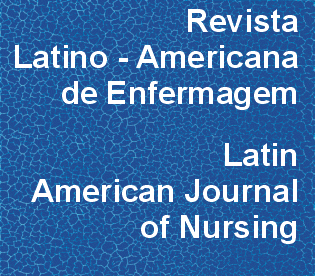Estudo de coorte para avaliar o desempenho da equipe de enfermagem em teste teórico, após treinamento em parada cardiorrespiratória
DOI:
https://doi.org/10.1590/S0104-11692009000100007Palavras-chave:
parada cardíaca, enfermagem, educaçãoResumo
O objetivo deste estudo foi avaliar o conhecimento teórico da equipe de enfermagem quanto ao atendimento a vítimas de parada cardiorrespiratória (PCR) antes, imediatamente após e decorridos seis meses de treinamento. Usou-se o método estudo de coorte, conduzido em um hospital especializado em cardiologia, Porto Alegre, RS (novembro/2005 a maio/2006). Incluíu-se enfermeiros (35 no pré-teste, 34 no pós e o mesmo número após seis meses), técnicos e auxiliares (232 no pré, 227 no pós e 104 após seis meses). Aplicou-se um questionário nos três períodos, considerando-se 'conhecimento satisfatório' 75% de acertos. Os resultados mostraram, no pré-teste, que 62,9% dos enfermeiros atingiram o percentual considerado satisfatório, no pós, 94,1% e decorridos seis meses, 64,7%. Entre os técnicos e auxiliares, no pré, 36,2% atingiram o percentual considerado satisfatório, no pós, 79,3% e 62,5% decorridos seis meses. Conclui-se que o treinamento em PCR melhora o conhecimento da equipe logo após o treinamento, havendo redução do escore de acertos após 6 meses.Downloads
Os dados de download ainda não estão disponíveis.
Referências
Downloads
Publicado
2009-02-01
Edição
Seção
Artigos Originais
Licença
Os direitos autorais são de propriedade exclusiva da revista, transferidos por meio da Declaração de Transferência de Direitos Autorais (presente no Formulário Individual de Declarações) assinada pelos autores. Para a utilização dos artigos, a RLAE adota a Licença Creative Commons, CC BY-NC Atribuição não comercial (resumo ou código completo da licença). Com essa licença é permitido acessar, baixar (download), copiar, imprimir, compartilhar, reutilizar e distribuir os artigos, desde que para uso não comercial e com a citação da fonte, conferindo os devidos créditos autorais a Revista Latino-Americana de Enfermagem. Nesses casos, nenhuma permissão é necessária por parte dos autores ou dos editores.Como Citar
Brião, R. da C., Souza, E. N. de, Castro, R. A. de, & Rabelo, E. R. (2009). Estudo de coorte para avaliar o desempenho da equipe de enfermagem em teste teórico, após treinamento em parada cardiorrespiratória. Revista Latino-Americana De Enfermagem, 17(1), 40-45. https://doi.org/10.1590/S0104-11692009000100007



